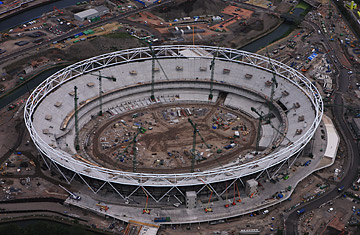
An aerial view of the Olympic Park at Stratford on September 9, 2009 in London
With all eyes trained on Copenhagen, where Rio de Janeiro was announced as the 2016 Olympic host city on Friday, it's easy to forget there will be a Summer Games between now and then. London is determined to put on a spectacular show in 2012, and given the city's early preparations, it may well achieve this goal. But just how far along are the key building and transportation projects, as well as plans for security? TIME offers a report card on the preparations with 1029 days to go:
Infrastructure
The majority of the 26 sports will be held in venues at the brand new
Olympic Park in Stratford, East London. Construction is underway at the
park's "Big Five" venues — the main Olympic stadium, the aquatics center, the
velodrome, the Olympic village and the broadcast/media center. London is on
track as far as timing and budget are concerned, which is a feat considering
this is the largest building project anywhere in Europe, said John Armitt,
head of the Olympic Delivery Authority. The
International Olympic Committee has also taken notice: Chairman Denis Oswald
said recently he is "greatly impressed by the good progress that London 2012
has made." In addition to the sporting venues, London is also building more
than 30 new bridges, about 20 miles of new roads, a wind turbine to supply
the park with renewable energy, and new water, gas, electrical, telecom and
sewage facilities.
East London, one of the least developed regions of the city, looks set to benefit in the long term. When the Games are over, the Olympic Village will be converted into nearly 3,000 new homes, more than half of which will be set aside as affordable housing. East London will also have new education facilities, retail and office space and a world-class transport hub. "We're building [all] this with the Games and legacy in mind," says Joanna Manning Cooper, spokeswoman for the London Organizing Committee of the Olympic Games (LOCOG).
But there are some concerns that costs could spiral out of control. London Mayor Boris Johnson has put forth a plan to cut £20 million ($32 million) from the budget by holding certain events (boxing, shooting, rhythmic gymnastics and badminton) in existing venues such as Wembley Arena — even if this means longer transport time for athletes staying at the Olympic Village. In response to recent opposition from the Olympic Board, which in addition to Johnson includes Lord Sebastian Coe, the LOCOG chairman, the ever-quotable Johnson evoked former Soviet leader Nikita Khrushchev, saying: "If I have to take my shoe off and bang it on the desk I will."
Grade: B
Transport
Transport authorities have been making steady improvements in the city's
Underground system for a number of years, including extending the Jubilee
Line to Stratford for the Games. Four new stations are also being built on
the Docklands Light Railway system in East London, including two in
Stratford. But above ground, there have been a few bumps along the way. Every host city has to designate a network of
roads, known as an Olympic Route Network, which will be used by athletes and
officials to get to the event venues. London police have expressed concern
that the lanes reserved for Olympic use could slow ambulances and increase
congestion. But Cooper says traffic shouldn't be an issue, thanks to
London's Underground and rail systems. "Our premise is that this will be a
public transport Games," she says.
Grade: B
Finances
Naturally, some Londoners are worried that organizers won't be able to stick
to their £9.3 billion ($14.8 billion) budget and taxpayers will end up
shelling out any extra money required. Of the public Olympic financing
bodies, the British government is kicking in nearly £6 billion ($9.5
billion), the National Lottery £2.2 billion ($3.5 billion) and the city
government £1.2 billion ($1.9 billion). There's also a second budget of £2
billion ($3.2 billion) that is being privately funded. Still, it's difficult
to say how much will eventually be spent to host the event. "No one will
ever know the true Olympic budget," says Stefan Szymanski, professor of
economics at the Cass Business School in London. "A large number of public
servants have been diverted to Olympic work without anyone [putting a value
on] the use of their time, and various costs have been diverted to other
budgets." With the world still in recession, the organizers' ability to
secure more funding for the Games may prove to be problematic.
Grade: C
Security
With the Games coming just seven years after the 2005 London transport
bombings, terrorism is still a major concern for the city. And keeping the
Olympic athletes and spectators safe won't come cheaply, so once again,
money has become a concern. "The cost of providing the security for the
London Games will be astronomic," Szymanski says. Britain's Home Office
estimates that security will run about £600 million ($959 million), but with
three years to go before the event, the agency can't say exactly how the
money will be spent. Apart from that are the logistics. "It's not an event
you will be able just to turn up at and get in [quickly]. The challenge for
London will be to maintain a sense of informality and spontaneity among all
the baggage checks," Szymanski says. And, perhaps, keeping people
entertained in the interminable security lines.
Grade: B
